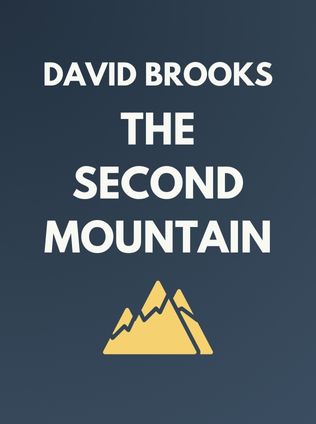
The Second Mountain
By David Brooks
Published 01/2019
About the Author
David Brooks is a prominent cultural commentator and columnist for The New York Times, renowned for his insightful exploration of social and moral issues in contemporary society. With a keen eye for analyzing the shifting paradigms of Western culture, Brooks has carved a niche for himself as a thoughtful and nuanced voice in public discourse. His previous works, such as The Road to Character, delved into the virtues necessary for personal and societal well-being, emphasizing the importance of moral development over material success.
In The Second Mountain, Brooks continues this exploration, but with a more profound focus on the relational aspects of life. He contrasts the individualistic pursuit of personal success with a more community-centered approach, arguing for the importance of selflessness, commitment, and service to others as pathways to a meaningful life. Drawing from his own experiences and observations, Brooks provides a roadmap for those seeking to find deeper fulfillment beyond the shallow rewards of individualism.
Main Idea
The central thesis of The Second Mountain revolves around the idea that true fulfillment in life comes not from the pursuit of individual success, but from the commitments we make to others. Brooks argues that Western culture, with its emphasis on individualism, has led to widespread dissatisfaction and loneliness, as it encourages people to prioritize personal freedom and self-expression over community and relationships. In contrast, he advocates for what he calls "relationalism," a worldview that prioritizes commitment to others and service to the greater good.
Brooks outlines four key commitments that he believes are essential for leading a fulfilling life: commitment to a vocation, to a spouse, to a community, and to a belief system. These commitments, he argues, help us move beyond the shallow rewards of individualism and towards a deeper, more meaningful existence. Through these commitments, we find purpose, identity, and genuine freedom, as they mold us into more virtuous, selfless individuals.
Table of Contents
- The Individualist Approach to Life
- The Relationalist Approach to Life
- Commitment 1: Your Vocation
- Commitment 2: Your Marriage
- Commitment 3: Your Community
- Commitment 4: Your Belief System
The Individualist Approach to Life
In Western culture, individualism is the prevailing worldview, encouraging people to pursue personal happiness and view self-expression as life’s primary goal. Brooks critiques this approach, arguing that it ultimately leads to deep dissatisfaction because it fails to satisfy our innate desire to connect with and serve others. Individualism, according to Brooks, arose as a response to the communal focus of earlier generations, particularly in the aftermath of two world wars and the Great Depression. It promised freedom and self-determination, but at the cost of weakening the ties that bind us to our families, communities, and larger society.
"The freedom that individualism prizes often leaves us insecure and unfulfilled because it doesn’t address our deeper need for connection and purpose." — David Brooks
Brooks identifies several assumptions underlying the individualist worldview:
Sign up for FREE and get access to 1,400+ books summaries.
You May Also Like
The Subtle Art of Not Giving a F*ck
A Counterintuitive Approach to Living a Good Life
By Mark MansonRich Dad Poor Dad
What the Rich Teach Their Kids About Money - That the Poor and Middle Class Do Not!
By Robert T. KiyosakiHow To Win Friends and Influence People
The All-Time Classic Manual Of People Skills
By Dale CarnegieFreakonomics
A Rogue Economist Explores the Hidden Side of Everything
By Steven D. Levitt and Stephen J. Dubner



















